Another Timbre TimHarrisonbre
Interview with Alfredo Costa Monteiro
When did you start playing music, and what drew you to experimental music and improvisation?
I started playing accordion when I was ten. It wasn’t really a decision, but almost an accident: a gift from my father. I played it for many years, but as a teenager I was much more interested in sounds that related to my condition, so at around 15 I started playing guitar and keyboards in rock bands. None of them produced a serious end-result and later I stopped making music and focused on visual arts. But while studying at Fine Arts school sound was very present in my work. And I realised that I was much more interested in the psychology, the semantics or simply the presence of sound in itself than in its musical form. So the first
connection between visual arts and music was in some personal experiments in my art work. This was also the time when I discovered free jazz and anarchism and had a short bout of political activism, which quickly stopped through disappointment.
I came back to music in 1995, but with feedback from my art work and a stronger interest in sound. I started playing as a multi-instrumentalist in an experimental rock band called Superelvis, here in Barcelona. Our music was based on collective modal /tonal improvisation and a lack of hierarchy. Having played in punk groups, I could find a pretty similar spirit that allowed me to make music without any kind of accurate technique and a joyful sense of chaos. Intention was the key.
Slowly I began other collaborations that led me to a more abstract form of expression, and in 2001, as I was feeling more and more comfortable with free improvisation, I set up my own projects.
I’ve always felt a strong fascination for sound. Maybe it’s an inner curiosity or a deeper perceptive connection; whatever it is, I’ve always been more permeable to sound than to images. Another important point that may have been significant was the discovery of electro-acoustic music while studying classical guitar at the conservatory at the age of 15. The realisation that reality could be transformed by sound was a total revelation for me (and this discovery led me to leave the conservatory…)
I guess such a sensibility belongs to a larger process which is part of our understanding
of the world. I still consider sound as one of the most powerful enigmas (psychologically
and technically) that keeps my perception in close connection to reality.
I assume that you’re from Portugal originally. When and why did you move to Barcelona? And what is the improv scene in Barcelona like today?
I was born in Portugal and lived there until 8. Then for political and economical reasons, my parents moved to Paris, where I lived for 20 years. In 1992 I moved to Barcelona for reasons of love, but it happened at just the right moment for me, because after 20 years living in Paris I needed a change.
Once in Spain I had to deal with new cultural values, behaviours, spaces and sounds. I went on producing visual/sound installations, and as I mentioned before, slowly started a parallel activity in a certain way connected to my art work. It was very easy to be part of the scene in Barcelona because there was a great deal of respect and openness.
Nowadays it’s a very small and quite fragmented scene, in part because of a lack
of a real tradition in this field; there are very few venues, almost no trust in
this practise from institutions, almost no funding...but, there are some really talented
musicians...I guess this lack of even a minimum infra-structure should make people
react, but it’s not so. For many years, I was part of a collective called IBA, and
we created a pole of synergies and intense activity by organizing festivals, workshops,
meetings and concerts. I left the collective two years ago, partly due to tiredness,
but also to focus on my own activity.
On various discs you play accordion, turntables,
electronics, paper and now solo cymbal. How do you choose which instrument to play
when? Do you have different styles of playing for each instrument, or do you basically
play in the same way regardless of what you're playing?
I carry out different activities in parallel, creating an echo between them. I keep
many correspondences which are not necessary and immediately obvious, my work being
regenerated constantly in a process that I like to define as nomadic. I’m not attached
to a form that could be a mark of identity, but rather to a method that could construct
this identity. For these reasons I’d say that the choice of sound source is part
of this process. It’s a sort of reactivation where whatever is acquired tends to
be the focus of a new speculation. It’s all about resoluteness and disinclination:
and between these two notions my intention is to create a new context for the music
to exist. The choice of a sound source is always connected to a previous idea of
what I want to build; in every case, there’s always a conceptual departure. But as
the praxis is fundamental for me as an experimental procedure, I always keep in mind
that the concept has to test the form. And in this way the instrument is accepted
in its original definition, as a simple tool, as a means to achieve a purpose. Of
course every instrument requires a different approach, but the basis of each intervention
is quite similar, only the context makes it different.
Do you manage to earn a living
from your music, or do you need a 'day job' to survive?
In Spain it’s very difficult to earn a living from this kind of music, at least if you try to remain honest. Extensions of this practise such as conferences, work-shops are very rare, and there are very few venues and festivals. So I work as a language teacher, which I really like and which occupies almost a third of my time, concentrated in three days, and which brings in a minimum salary. I mostly perform abroad.
I try to conserve a kind of pleasure principle in all my activities, even in my job.
For now I’m totally happy with my situation, because for me it’s also a way to protect
my artistic integrity, as I don’t have to make any kind of compromise for money.
When I say this I have in mind some professional improvisers, and their attitude,
which is represented in their music, is simply incomprehensible for me.
You have produced
a number of solo discs. What are the advantages and disdvantages of playing solo
as against group playing?
Playing solo seems to be the most free form of expression, but it’s also the most arid. When I’m playing alone, I’m the only one responsible for what’s happening. It’s very rewarding, because you learn a lot about yourself; no justification to a third person is needed, and some acts can keep the status of secrets never revealed. But this is also what can make it dangerous in the way that if only I know what my intention was, then it’s easier to pretend that it’s been achieved even when it hasn’t! Playing alone requires more honesty with oneself, and as long as one is able to recognise one’s mistakes, it’s fine.
But obviously the music changes when another subjectivity comes into play. You enter
into a consensus (even when you’re not really playing together) that nourishes your
practise, not just artistically but also in human terms. And as I strongly believe
that this practise is related to human exchange and political consensus, I also need
a group context to continue building an open subjectivity.
Would you describe some
of your music as 'noise music'? You have also used the term 'quiet noise music',
so what is your relation to 'noise'?
Noise music, as it’s called and defined, requires some parameters that I don’t fulfil, simply because I’m not interested in using them the way they are required. On the other hand I’m interested in the energy of loud noise, in its capacity of trans-figuration and most of all in its physicality, which is an amazing virtue: not just for the power of its presence, but also for its perturbing force socially and politically.
In this way sound crosses the boundaries of what is socially acceptable and literally invades reality. For me, it’s more a realisation than an act of aggression or a provocation.
At the same time I’m very attracted by the inner body of this physicality. And I believe that to make it understandable, high volumes can be an obstacle. In my music dynamics are fundamental. There’s a tendency to mix the word ‘noise’ with the label ‘noise music’. Noisy music and noise music are different to me, the first using an adjective to describe and qualify the music, and the second defining a genre. It’s curious that in Latin languages when we use the word ‘noise’ in English (without being translated) it means ‘noise music’, and otherwise we use a translated word (bruitiste in French, ruidista in Spanish and Portuguese, rumoroso in Italian...) Once I used the expression ‘soft noise music’ as an irony, trying to describe a piece of mine that was pretty much this: noise music in its essence but with a soft volume...I try to give to each material I use the volume and intention I consider correct. It could have to do with psychological tension, erotic pulsions, inner perceptions, vibration or simply the mood of the moment.
You have played with many leading improvisers over the past few years. Are there
any that made a particular impression on you, or who you feel you learnt a lot from? And
is there anyone who you'd particularly like to play with who you haven't played with
yet?
I see collaborations as processes of feedback where the information flux is redistributed by each collaborator, and influence is part of this flow. Transmitter and receptor are pretty much part of the same intention. In this context I always learn from others, and if not, I would stop collaborations. But for me, it’s not just about music, it’s also about energy. I consider music as part of this energy that brings me closer to or drives me apart from a musician. As the years go by we have to be conscious of the fact that there’s less and less capacity to be surprised, impressed or influenced by other people’s music. When I think of somebody I’d like to play with, I imagine what my contribution could be and how it could change his or her music. I love the work of many musicians, but in many cases I don’t see what I could bring to their music.
But still, I’m attracted by musicians I’ve never played with. Jérôme Noetinger is one of them. We have played together in larger groups, but not yet as a duo, though we’ve talked about it many times. And I’d love to play with John Tilbury, Otomo Yoshihide and Lee Patterson.
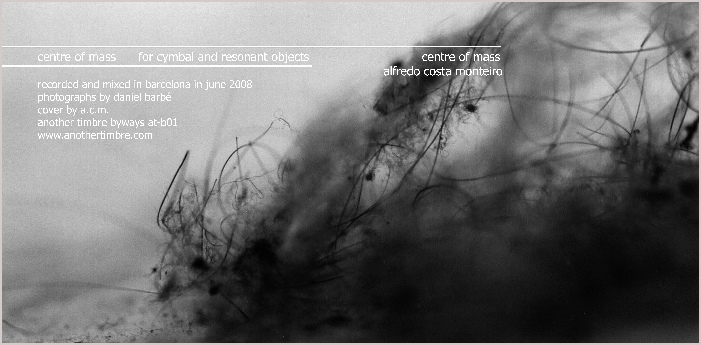
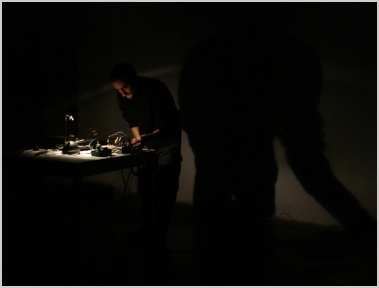
Photo: Dimitra Lazaridou Chatzigoga
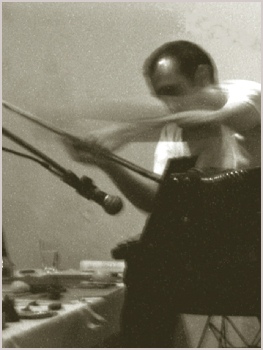
Photo: Tania Peris
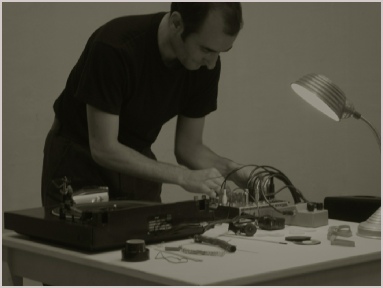
Photo: Pau Torres
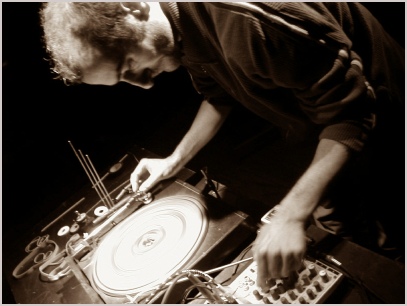
Photo: Ferran Fages
‘Centre of mass’ - Alfredo Costa Monteiro, another timbre by-ways, at-b01